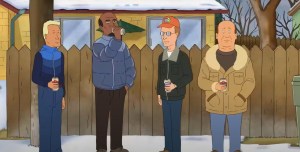A couple of months back, DC made huge waves when they announced “Hush 2,” a sequel to the fan favorite Batman storyline “Hush” that came out over twenty years ago. Furthermore, the legendary team of Jeph Loeb and Jim Lee would reunite to handle the book, news that had fans more excited than ever. After all “Hush” is an iconic Batman story. However, even ignoring the fact that “Hush” never needed or deserved a sequel in the first place, this comic book has proved one thing and one thing only; comic books have got to move on from using weaponized nostalgia to sell their stories. This needless sequel prioritizes being familiar over story, character, and continuity, and its constant attempt to recapture the feeling of “Hush” only serves to drag it down even further.
Videos by ComicBook.com
“Hush 2” Offers Nothing But What We’ve Already Seen
This storyline has faltered in just about every conceivable way so far. The main issue present is that the entire comic operates like “Hush” just released last week instead of twenty-three years ago. Batman treating Hush like a dangerous enemy is fine, especially after everything he did during his original reign of terror, but how Bruce and the rest of the characters interact just does not feel right. Jason Todd is the prime example. He continuously goes off about how he’s angry that Batman refused to kill the Joker, and fights against the Dark Knight because, supposedly, his brain is deteriorating in a way that the Lazarus Pits couldn’t fix. Maybe that would have been an interesting thing to explore following “Under the Red Hood” when Jason first returned, but he’s been alive and kicking for two decades. I feel like if there was any significant brain damage, he would have either definitely noticed it by now, or gotten it from the innumerable times his helmet has been broken off of his face.
And then there’s the Riddler, who revealed to Nightwing and Batgirl that he knows who they are. But again, Riddler has known since the original “Hush” storyline, so this coming as a major shock to the two of them really doesn’t seem right. I can’t imagine Batman didn’t tell them one of his biggest villains knows all of their secret identities. This weird time displacement feeling even carries over to the side characters. When Batman meets Hush’s supervillain associate Armori, she claims that she didn’t even believe Batman was real. Maybe that line worked back in the early 2000s, where Batman still liked to maintain the idea that he was more myth than man, but literally last story arc he landed a crashing airplane in the middle of the street and leapt out to punch a man. This might seem like a small nitpick, but it’s just a small piece to show how the greater whole is coming apart at the seams.
[RELATED: This Fan Favorite Batman Story Isn’t The Masterpiece It’s Made Out to Be (And I Will Die on This Hill)]
“Hush 2” prioritizes having situations and characterizations that are familiar over actually being good or connecting with the rest of the universe around them. For example, at the tail end of issue #160 Damian Wayne and Bane jump in to save Batman, and while there’ll be some explanation next issue, we all know the real reason those two are working together is because Bane killed Alfred in front of Damian and people remember that. It’s all nostalgia first, and story second.
Comic Books Need to Let Go of the Past
This obsession with what’s familiar isn’t new to comic books. All comic book characters have a status quo that they inevitably will always reset to, which is admittedly required for the characters to both star in never-ending stories and remain enough like themselves to always be recognizable. Again, nostalgia isn’t a bad thing when used correctly. Heck, Justice League Unlimited is doing this right now. Sure, the name makes sense for the expansion the League is going through by including every hero who wants to join, but we all know the real reason they are named that is to tie into the cartoon that plenty of comic book fans remember very fondly from their childhood. Nostalgia can be fine, but it becomes a major problem when the story only focuses on being that image fans have in their minds.
Look at any Teen Titans lineup since the release of the early 2000s cartoon, whose lineup itself is a direct, nostalgia-directed reference to the New Teen Titans roster that popularized the team. Nostalgia sells, but it isn’t enough to carry a story on its own. It’s like a spice; a little bit on a good meal can elevate it to new heights, but too much just hurts your guts. “Hush 2” only cares about reminding fans how it felt to read the original, and without presenting anything new and by actively being a detriment to the other stories around it, all it does is alienate fans who want to see things develop. This obsession with the past continues to haunt comic books and hold them back from actually telling meaningful stories. Frankly, as much as I love the old stories, what I and other fans really want is to let these beloved characters be the best they can be, and that answer is not in the pages of their worst or best days, it’s the future we build upon those days.









